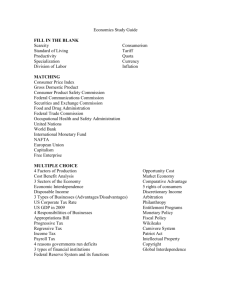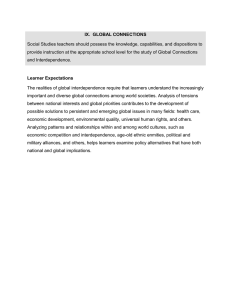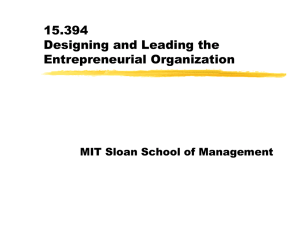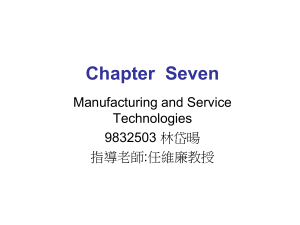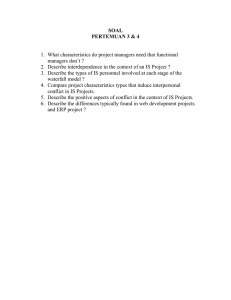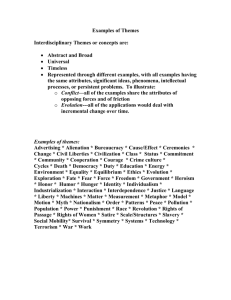liberal
advertisement
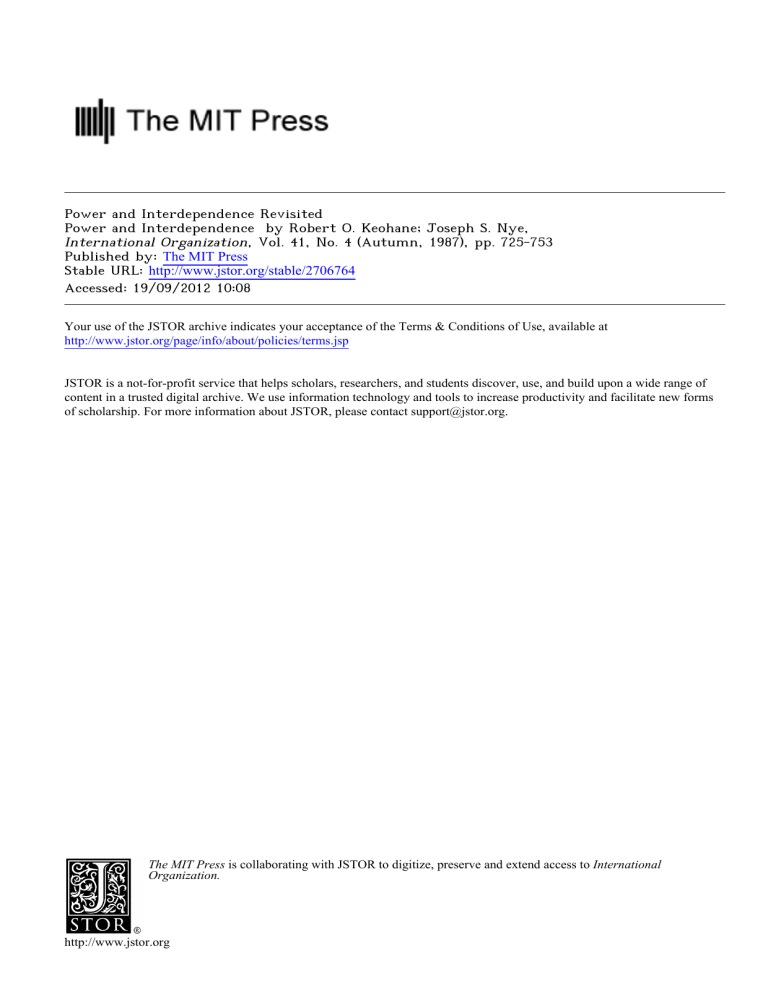
Power and Interdependence Revisited Power and Interdependence by Robert O. Keohane; Joseph S. Nye, International Organization, Vol. 41, No. 4 (Autumn, 1987), pp. 725-753 Published by: The MIT Press Stable URL: http://www.jstor.org/stable/2706764 . Accessed: 19/09/2012 10:08 Your use of the JSTOR archive indicates your acceptance of the Terms & Conditions of Use, available at . http://www.jstor.org/page/info/about/policies/terms.jsp . JSTOR is a not-for-profit service that helps scholars, researchers, and students discover, use, and build upon a wide range of content in a trusted digital archive. We use information technology and tools to increase productivity and facilitate new forms of scholarship. For more information about JSTOR, please contact support@jstor.org. . The MIT Press is collaborating with JSTOR to digitize, preserve and extend access to International Organization. http://www.jstor.org revisited Powerand Interdependence Robert0. Keohane and JosephS. Nye, Jr. 1Thepassageofa Ten yearsago we publishedPowerandInterdependence. timeto rereadand reevaluatethatbook, decademakesthisan appropriate In doing to whichitcontributed. and to takestockoftheresearchprogram ofthepoliticsof understanding this,we hopeto deepenandenrichscholarly forthe fieldof on directions and to stimulatereflection interdependence international relationsoverthenextdecade.2 opportunegiventhe changesin Such a reappraisalseems particularly worldpolitics,and especiallyin Americanpolicy,thathave markedthe in 1979thattheauthors intervening years.StanleyJ. Michalakcommented maywell "may cringefromthe analogybutPowerand Interdependence becomethePoliticsAmongNationsofthe1970s."3Butfromtheperspective ofthelate 1980s,theworldmaylookdifferent: whilethe1970swereseenas thedecadeofinterdependence, manyobserversregardtheuse offorceand concernforsecurity ofthe1980s.Indeed,theviewis wideas characteristic spreadin some circlesthatthe 1980sresemblethe 1950smorethanthe workis morerelevantto contempo1970s,and thatHans J. Morgenthau's raryissues of world politics thanPower and Interdependence. on earlierversionsofthispaperto DavidA. Baldwin, We aregrateful forwritten comments JamesA. Caporaso,AlexanderL. George,ErnstB. Haas, StephanHaggard,StanleyHoffStephenKrasner,DavidLaitin,HelenMilmann,HaroldK. Jacobson,PeterJ. Katzenstein, ner, Andy Moravcsik,M. J. Peterson,Steve Solnick,and an anonymousreviewerfor forWarand to members of theInstitute International and fororalcomments Organization; relationsfieldseminar,Harvard and theinternational Peace Studies,ColumbiaUniversity, University, spring1987. 1. Boston:Little,Brown,1977. 2. Raymond thisevaluativeprocessbylookingback Vernon,alwaysa pioneer,exemplified he respondedto at Bay, tenyearsafterits publication; at his important book, Sovereignty at Bay Ten Years After,"Internaand addedhis own. See Vernon,"Sovereignty criticisms tional Organization35 (Summer 1981), pp. 517-30. In a recent special issue of International StudiesNotes 12 (Spring1986),JamesN. Rosenau,KennethE. Boulding,JohnH. Herz, on theirwork. WilliamT. R. Fox, and RobertC. Northalso reflected InterdeInternational forUnderstanding 3. StanleyJ.Michalak,"TheoreticalPerspectives pendence,"WorldPolitics32 (October1979),p. 150. InternationalOrganization41, 4, Autumn1987 ? 1987bytheWorldPeace Foundation andtheMassachusetts Institute ofTechnology Organization 726 International Duringthe 1970s,Americanswere reactingagainstthe VietnamWar; ofthenucleararmsrace;oil crises detenteseemedto reducetheimportance and the collapse of the BrettonWoods systemof peggedexchangerates fundamental shifts intheworldpoliticaleconomy.A represeemedtoreflect was that"theforcesnowascensentative viewamong"modernist"writers dent appear to be leaningtowarda global societywithouta dominant in whichnation-states, structure of cooperationand conflict-apolyarchy special interestsand communities subnationalgroups,and transnational and conflicts wouldall be vyingforthesupportand loyaltyofindividuals, in a on thebasis of ad hoc bargaining wouldhave to be resolvedprimarily 4 shifting contextofpowerrelationships." Bythe1980sthemoodintheUnitedStateshadchanged,undertheimpact theseizureofhostagesbyIran,anda oftheSovietinvasionofAfghanistan, forces.Americanpolicyfocusedon build-upof Sovietstrategic continuing ratherthanon North-South issuesand theactiviEast-Westconfrontation the deUnderthe Reaganadministration, institutions. ties of multilateral yearsforthe firsttimesince the fensebudgetincreasedforfivestraight beginning of theCold War,and theUnitedStateswas morewillingto use weak statessuchas Grenada military force,albeitagainstsuch extremely ofnuclear andthemodernization andLibya.Armscontrolwas downgraded forceswas accelerated. Yet thedifferences betweenthe 1970sand 1980scan easilybe exaggerand ecoand moodhave changedfarmorethanmilitary ated. Psychology of economicproduction nomicindicesof powerresources.The diffusion as measuredbysharesinworldtradeorworldproduct.Sensitivity continues in financeand tradecontinuesto increase,althoughvulinterdependence marnerability to supplyshockshas eased in a periodof slackcommodity therelationsbetweenthe kets. Moreover,despitesome of theirrhetoric, do not show a returnto theCold War period.Not onlyare superpowers on allianceslooser,butthereare morecontactsbetweenthesuperpowers theanalyarmscontrolanda varietyofotherissues.In ourview,therefore, inPowerandInterdependence hasnotbeenrendered sisthatwe putforward by events.The real questionsare not aboutobsolescence,but irrelevant aboutanalyticalcogency. themes The firstsectionofthisarticleexaminesthethreemostimportant theideal betweenpowerandinterdependence, ofthebook: therelationship of changesin internaand explanations typeof complexinterdependence, tionalregimes.In thesecondsection,we critiqueourconceptsandtheories, for and examinewhichelementsof our argument have been mostfruitful laterwork.The thirdand fourthsectionsraise questionsaboutconcepts, suchas thoseof "systemicpoliticalprocess" and "learning,"thatwe did D.C.: Brookings Institution, 4. SeyomBrown,New Forcesin WorldPolitics(Washington, 1974),p. 186. Powerand independence727 but whichwe think not explicateclearlyin Power and Interdependence directions forfutureresearch. suggestfruitful 1. PrincipalthemesofPower and Interdependence "politicalrealism"withaccepwe identified In Powerand Interdependence tanceoftheviewthatstatebehavioris "dominatedby theconstantdanger ofmilitary andwe arguedthat"duringthe1960s,manyotherwise conflict," keenobserverswhoacceptedrealistapproacheswereslowto perceivethe conof new issues thatdid not centeron military-security development Relations cerns"(p. 5). As we haddoneinoureditedvolume,Transnational of "today'smultidimenand WorldPolitics,5we pointedto theimportance (p. 4). Yet Power sionaleconomic,social and ecologicalinterdependence" or tonefromthatofourearlierwritings, andInterdependence hada different writWe criticized modernist ofpopularizers ofeconomicinterdependence. state,whichhas been ers who "see our era as one in whichtheterritorial sincefeudaltimesended... dominant inworldpoliticsforthefourcenturies actorssuchas multinational corporations, is beingeclipsedbynon-territorial (p. 3). In organizations" and international social movements, transnational ourview,to exchangerealism"foran equallysimpleview-for instance, benignthatmilitary forceis obsolete and economicinterdependence errors"(p. 5). wouldcondemnone to equallygrave,thoughdifferent, costlyfor We did arguethatthe use of forcehas becomeincreasingly risksofnuclearescalation;resismajorstatesas a resultoffourconditions: tancebypeoplein pooror weakcountries; andpossiblynegative uncertain of economicgoals; and domesticopinionopeffectson the achievement posed to thehumancosts of theuse of force.But we also notedthatthe or authoritafourth hadlittleimpacton thepoliciesoftotalitarian condition riangovernments, and we warnedthat"lesser statesinvolvedin regional groupsmayfindit easierto use forcethan rivalriesand nonstateterrorist trendsintheroleofforceis toerode before.The neteffect ofthesecontrary based on military power"(p. 228). hierarchy we madeaboutsyswe thinkthatthegeneralargument Upon rereading, of temicconstraints on theuse offorcehas heldup ratherwell.The utility ofattackby others. limitedto deterrence nuclearforceremainsprincipally on the The social mobilization of populationshas acted as a constraint and in Afghanistan as boththefailureof Sovietintervention superpowers, theweaknessof theAmericanresponseto Iran's takingof hostageshave despiteits indicated.Even in CentralAmerica,theReaganadministration, U.S. ground has beencautiousaboutintroducing ideologicalcommitments, 5. Robert0. Keohane and JosephS. Nye, eds., TransnationalRelations and WorldPolitics. HarvardUniversity Press,1972). (Cambridge: 728 International Organization oftheEisenhower lowcostandeffectiveness forces.Comparetherelatively in Iran (1953),Guatemala(1954),and Lebaadministration's interventions encountered bytheUnitedStates non(1958)withthemorerecentdifficulties the1980s.Theuse offorceagainsta inIran,Nicaragua,andLebanonduring of Grenadaand the limitedair narrowlybased regimein the mini-state strikesagainstLibya are the apparentexceptionsthatprove the rule: Grenadawas virtually powerless,and againstLibya, the UnitedStates of groundtroops.Furthermore, theuse of forceby avoidedcommitment has conformed toourdescription, andtheeffecsmallerstatesandterrorists has beenquitelimited. tivenessofAmericanuses offorceagainstterrorism forcelaidthebasis aboutconstraints on theuse ofmilitary Ourargument Thisanalysis forouranalysisof thepoliticsofeconomicinterdependence. containedthreeprincipalthemes,whichwe did not explicitly distinguish fromone another: draw1. A power-oriented analysisofthepoliticsofinterdependence, ingon bargaining theory; 2. An analysisof an ideal typethatwe called "complexinterdependence" and oftheimpactoftheprocessesthatit encompassed; to explainchangesin international regimes-whichwe 3. An attempt definedas "sets ofgoverning arrangements thataffectrelationships of interdependence" (p. 19). is developedin chapter1, whichlinks Our analysisof interdependence interdepentheconceptofasymmetrical interdependence to powerthrough we dence as a powerresource."It is asymmetries in interdependence," foractorsin wrote,"thatare mostlikelyto providesourcesof influence theirdealingswithone another"(pp. 10-11,italicsin original).This coninterdependence is a sourceofpower,can be found cept,thatasymmetrical clearlyin AlbertHirschman's National Power and the Structureof Foreign Trade,6as well as in KennethWaltz's articleon "The Mythof National Interdependence."7 Ouranalysislinkedrealistand neorealistanalysisto concernsofliberals withinterdependence. to realisttheory as an alternative Ratherthanviewing liberal"interdependence theory,"we regardedthetwoas necessarycomjustified,in our plementsto one another.This approachwas analytically bothhave theirrootsin a utilitarian view,because realismand liberalism by actorspursuetheirowninterests viewoftheworld,in whichindividual to incentives. Bothdoctrines viewpoliticsas a processofpolitresponding bybargaining. Broadlyspeaking, icalandeconomicexchange,characterized 6. AlbertHirschman,National Power and theStructureofForeign Trade (Berkeley:Univer- sityofCalifornia Press,1945). Mass.: MIT 7. In CharlesKindleberger, ed., TheInternational Corporation (Cambridge, Press,1970). Powerand independence729 thatmost withthe assumption bothrealismand liberalismare consistent as rational,or at leastintelligent, statebehaviorcan be interpreted activity. paradigms are therefore nottwo incommensurable Realismand liberalism withdifferent conceptionsofthenatureofpoliticalaction.8 Nevertheless, realistand liberaltheoryare in severalrespectssharplyat disputefocusesespeciallyon the oddswithone another.The realist-liberal goals of actorsin worldpoliticsand on the natureof theirenvironment. andthedangers Realismemphasizesstates'demandsforpowerandsecurity forrealism,themostimporforceis therefore, to states'survival.Military on their tantpowerresourcein worldpolitics.Statesmustrelyultimately own resourcesand muststriveto maintaintheirrelativepositionsin the system,evenat higheconomiccost. Liberalismalso examinesstateaction ecoto othergroupsas well. For liberalthinkers, butdirectsits attention Among for security. as well as concerns are important nomicincentives the expanding threatsmaybe insignificant, republics,at anyrate,military the the of force and role potentialarea forcooperationand reducingboth in the international their relative power positions place on emphasisstates system. was deliberately The discussionofrealisminPowerandInterdependence thanin therealisttradition indescribing We wereless interested incomplete. andassessingtheirrelevancefor examining someofitscentralassumptions Some reviewerstookus to theanalysisofthepoliticsof interdependence. to applyold approachesor taskfor,in K. J. Holsti'swords,"attempting "setting modelstoareasforwhichtheywereneverintended,"andtherefore thatour "strawmanmay up strawmen." StanleyJ. Michalakcommented wellbe 'parsimonious' andeasytotest,butithas littletodo withrealism."9 Liberalismas a traditional althoughour theoryescaped mentionentirely: theory,whichsharedkey analysiswas clearlyrootedin interdependence to locate ourselveswith we made no effort withliberalism, assumptions we wereseekingin As we nowsee thematter, respecttotheliberaltradition. strandofliberalism thathad beendevelpartto broadentheneofunctional opedby ErnstB. Haas and othersinthe1950sand 1960s,butthathadbeen a version We presented integration. totheanalysisofregional largelylimited different terms,see K. J. 8. Fora recentanalysisthatmakesthispointwell,usingsomewhat Holsti, The DividingDiscipline: Hegemonyand Diversityin InternationalTheory(Winchester, Mass.: Allen& Unwin,1985). 32 (Spring Politics?"International Organization 9. K. J. Holsti,"A New International Perspectives," p. 148.Fora meaculpaanda systematic 1978),p. 525;Michalak,"Theoretical see Robert0. Keohane,"Theoryof to articulate realistand neorealist assumptions, attempt Realismand Beyond,"in Ada Finifter, WorldPolitics:Structural ed., PoliticalScience:The D.C.: American PoliticalScienceAssociation, StateoftheDiscipline(Washington, 1983),pp. in Robert0. Keohane,Neorealismand its Critics(New York:Columbia 503-40,reprinted UniversityPress, 1986), pp. 158-203. Keohane's latervolume,AfterHegemony: Cooperation and Discord in the World Political Economy (Princeton,N.J.: PrincetonUniversityPress, liberal seeksto builda theoryofinstitutions, withwhatcouldbe considered 1984),explicitly withthoseofpoliticalrealism. on premisesthatare consistent implications, Organization 730 International arguments andthattookthedistribuofthattheorythatavoidedteleological power,economicpower,and the role of statesfullyinto tionof military account.'0If we had beenmoreexplicitaboutlocatingourviewsinrelation we mighthave avoidedsome of realismand liberalism, to the traditions subsequentconfusion. sinceit generatesclassicproblemsofpoliticalstrategy, Interdependence actors,willimnon-state impliesthattheactionsof states,and significant pose costs on othermembersof the system.These affectedactorswill to avoidhaving iftheyhavethecapacity,in an attempt respondpolitically, policystandforceduponthem.Fromtheforeign theburdensofadjustment is how to benefitfrom point,the problemfacingindividualgovernments as muchautonomyas possible. international exchangewhilemaintaining system,theproblemis how to Fromthe perspectiveof the international beneficialpatternof cooperationin the generateand maintaina mutually actors)to (and nongovernmental by governments faceofcompeting efforts thesystemfortheirownbenefit." manipulate we emphasizedthatinterdeIn analyzing thepoliticsofinterdependence, lead tocooperation, nordidwe assumethat pendencewouldnotnecessarily be benignin otherrespects.The key itsconsequenceswouldautomatically madepowerobsolete-farfromit-but pointwas notthatinterdependence ofpotential powerresources thatpatterns ofinterdependence and patterns in a givenissue-areaare closelyrelated-indeed,twosidesofa singlecoin. sideby Thuswe soughtnotmerelyto place realistand liberalperspectives analysis.As David Baldwin in an integrated side,butto linkthemtogether laterobserved,"it shouldnotbe necessaryto developa separatetheoryto covereach issue-areaofinternational exchangerelations."12 in chapter2, introduced The conceptof "complexinterdependence," analysisofinterdependence reflected withthebargaining ourdissatisfaction to ofregionalintegration fromtheories toaddinsights alone,andourattempt to recognizethat"complex its spare realistassumptions.It is important from"interdepenas used in chapter2, is verydifferent interdependence," is a verybroadtermthat dence," as used in chapter1. "Interdependence" or amongcountries byreciprocaleffects refersto "situationscharacterized countries"(p. 8). It is as applicabletothepoliticalamongactorsindifferent theoryand theoriesofinterde10. For ouraccountoftheconnections betweenintegration inFredI. GreensandIntegration," Interdependence pendence,see ourarticle,"International teinand Nelson W. Polsby,eds., Handbookof PoliticalScience,vol. 8 (Reading,Mass.: was equally integration Addison-Wesley, 1975),pp. 363-414.KarlDeutsch'sworkon regional to thefieldas Haas's; although we discussbothinour1975article,ourownanalysis important owes a greater debtto Haas's neofunctionalism. does nothavea problem 11. In contrast to thisposition, Holstiassertsthatinterdependence focus:"The factofinterdependence," he says,"has to lead to a problembeforeit warrants seriousattention, just as concernwithwar,peace,orderandpowerled to ourfieldcenturies ago." (Holsti, The DividingDiscipline, p. 47). andPower:A Conceptual Analysis,"International 12. DavidA. Baldwin,"Interdependence Organization34 (Fall 1980), pp. 471-596. Powerand independence731 betweentheSovietUnionandtheUnitedStatesas interdependence military and Italy. betweenGermany interdependence itis to thepolitical-economic is an ideal typeof international by contrast, "Complexinterdependence," witha "realist"idealtypethat constructed to contrast system,deliberately aboutthenatureofinternawe outlinedon thebasis ofrealistassumptions amonga numrefersto a situation tionalpolitics.Complexinterdependence berofcountries inwhichmultiple channelsofcontactconnectsocieties(that ofissues; is, statesdo notmonopolizethesecontacts);thereis no hierarchy forceis notused bygovernments towardsone another(pp. 24andmilitary 25). We beginchapter2 by statingthat"we do notargue... thatcomplex worldpoliticalreality.Quitethecontrary; faithfully reflects interdependence willfallsomeareidealtypes.Mostsituations bothitandtherealistportrait wherebetweenthesetwoextremes." at Like thefrequently packages,ourwarning ignoredlabelson cigarette thebeginning ofchapter2 was forgotten bya number ofreaders,whotreated of as ifit wereourdescription ourdiscussionof complexinterdependence one. For inthereal worldratherthanour construction of a hypothetical theorists withtheclaim stance,RobertArt'sassociationofinterdependence aredeeplyentangled withanother's thata "nationwhoseeconomicinterests cannot use force . . . interestsintertwinedrender force unusable . . intheliberaltradition, butnotus.13On thecontrary, sometheorists portrays that inchapter1 we arguedthat"it mustalwaysbe keptinmindfurthermore militarypower dominateseconomic power . . . yet exercisingmore domi- nantformsofpowerbringshighercosts.Thus,relativeto cost,thereis no thatmilitary thaneconomicones to meanswillbe moreeffective guarantee achievea givenpurpose" (pp. 16-17). J. MartinRochesterassociatesus witha "globalist"or "modernist"view,even thoughwe declaredat the nor that"neitherthemodernists ofPowerand Interdependence ,beginning thepoliforunderstanding thetraditionalists have an adequateframework ticsofinterdependence" position,we (p. 4).14In contrastto themodernist disavowedtheviewthatcomplexinterdependence thewaveof is necessarily thefuture(pp. 226-29). Indeed,althoughwe beganourresearchon Power oftransnational relatheimportance andInterdependence largelytoconfirm tions,as discussed in TransnationalRelations and WorldPolitics,our inves- judgment. tigations produceda muchmorequalified inworld treatsall realsituations Chapter2 ofPowerandInterdependence betweenthe ideal typesof politicsas fallingsomewhereon a continuum Thus our emphasisin chapter2 is realismand complexinterdependence. Security 4 (Spring1980), Power?"International 13. RobertJ.Art,"To WhatEndsMilitary acknowledging in print however,forforthrightly pp. 16-17.Prof.Artshouldbe commended, thathe had misinterpreted Security 4 (Fall 1980),p. 189. ourviews.International Organization as a Field of 14 J. MartinRochester,"The Rise and Fall of International mistake occurs 1986),note52,p. 792.A similar Organization 40 (Autumn Study,"International in Ray Maghrooriand BennettRamberg,eds., Globalism VersusRealism: InternationalRela- tions'ThirdDebate (Boulder:WestviewPress,1982). Organization 732 International fromthatin chapter1. Insteadofseekingto explainbargainquitedifferent we ask interdependence, intermsofasymmetrical ingoutcomesstructurally interdependence on therealism-complex thelocationofa situation whether continuum can helpaccountforthepoliticalprocessesthatwe observe.The chapter2 is lineagesofthetwochaptersare also quitedifferent: theoretical moreindebtedto liberaltheoryin general,and theoriesofregionalintegration in particular,thanchapter1, whichrelieson a modifiedneorealist theory,our discussionof complexinterdepenanalysis.Like integration and transgovernmental as wellas interstate dencefocuseson transnational ofpoliticalprocesses anditseeksto examinehowcertainpatterns relations, to acexplanation affectactorbehaviorratherthanto employa structural countforaction. concernsinternaThe thirdmajorthemeofPowerand Interdependence arrangements tionalregimes,whichwe definein chapter1 as "governing (p. 19).Ourconceptofinternaofinterdependence" thataffect relationships tionalregimeswas indebtedto theworkof JohnRuggie,who definedregenerallyagreed-torules, gimesin 1975as "sets of mutualexpectations, energiesand andplans,inaccordancewithwhichorganizational regulations are allocated."'15Despite a claimmade by Susan financialcommitments in didnotinventthisconcept:ithas a longhistory Strange,socialscientists international law.16 elaboratesour conceptionof Chapter3 of Power and Interdependence modelswhichpurinternational regimesand offersfourroughly-sketched portto accountforchangesinthoseregimes.One modelrelieson economic one uses overallpowerstrucandtechnological change.Two are structural: ofpowerwithin tureto predictoutcomes,theotherrelieson thedistribution ConceptsandTrends," 15. JohnGerardRuggie,"International Responsesto Technology: InternationalOrganization 29 (Summer 1975), p. 569; see also Richard N. Cooper, "Pro- 29 Organization Monetary System,"International legomenato theChoiceofan International citestheworksby Ruggieand Cooperon (Winter1975),p. 64. Powerand Interdependence p. 20. 16. Susan Strange,"Cave! Hic Dragones:A Critiqueof RegimeAnalysis,"International in StephenD. Krasner,ed., International Regimes 36 (Spring1982),reprinted Organization Press,1983),wherethisclaimis madeon p. 344.For early (Ithaca,N.Y.: CornellUniversity see Fernandde Visscher,Le RegimeNouveaudes Detroits, uses of theregimeterminology, (Brussels: 1924), in Extraitde la Re'vue de Droit internationaleet de Legislation compar6e International Law, 5thed. (New York:Longmans,Green, (1924),nos. 1-2; L. Oppenheim, andtheElbe forLuxembourg vol. 1,pp. 207,366,on regimes 1937;editedbyH. Lauterpacht), Mass.: D. C. Heath: Regulatory Regimes(Lexington, River;David M. Leive, International JournalofInternaofarticlesin theAmerican Books, 1976),2 vols.; anda variety Lexington L. Butler,"The LegalRegimeofRussianTerritorial Waters," tionalLaw, including: 1) William vol. 62 (1968),pp. 51-77;2) RichardYoung,"The LegalRegimeoftheDeep-SeaFloor,"vol. A NewRegime andImmunities: 62 (1968),pp. 641-53;3) Leo J.Harris,"DiplomaticPrivileges is Soon to be Adoptedby the UnitedStates," vol. 62 (1968),pp. 98-113; 4) W. Michael Riesman,"The Regimeof Straitsand NationalSecurity,"vol. 74 (1980),pp. 48-76; 5) John ontheLaw of NortonMoore,"The RegimeofStraitsandtheThirdUnitedNationsConference theSea," vol. 74 (1980),pp. 77-121. Powerand independence733 model,"in which organization is an "international issue-areas.The fourth indepenare important, norms,and institutions of relationships, networks regimechange. dentfactorshelpingto explaininternational are to somedegreedisThe threethemesofPowerand Interdependence can be analyzedpoliticallywithoutendorsingthe tinct.Interdependence regimes;andtheconorinternational conceptsofcomplexinterdependence regimesdoes notdependforits validityon accepting ceptof international ofreality.Yet we sought as a usefulsimplification complexinterdependence we arguedthattheexplantorelateourthemestoone another.In particular, theoriesofregimechangewouldbe lower atorypowerofoverallstructure thanunderrealistconditions ofcomplexinterdependence underconditions was to someextent"decompossinceourargument (p. 161).Nevertheless, thatsomepartsof it fared able" intoits parts,it shouldnotbe surprising betterin thelaterscholarlydiscussionthanothers. 2. The researchprogramof Powerand Interdependence: a critique realismand liberalwe soughtto integrate In Powerand Interdependence, whichfocusedon bargaining. ismbyusinga conceptionofinterdependence force oftherealitiesofpower,butdidnotregardmilitary We werecognizant andrelativeposition as thechiefsourceofpower,nordidwe regardsecurity in viewofourearlierworkon goals of states.Ironically, as theoverriding analysisin Powerand relations,the resultof our synthetic transnational and of subsequentwork such as Keohane's After Interdependence, Hegemony,has been to broadenneorealismand provideit withnew conframework theoretical a coherentalternative ceptsratherthanto articulate forthestudyofworldpolitics.OfthethemesdiscussedinSection1 thoseof werebothmostcompatandinternational regimes interdependence strategic developedin Powerand Interdepeniblewithrealismand mostthoroughly remaineda relatively dence and later work. Complexinterdependence and undervalued concept. underdeveloped Interdependenceand bargaining in we emphasizedthatasymmetries In our analysisof interdependence, in worldpolitics:"Militarypower remainimportant vulnerability military dominateseconomicpowerin the sense thateconomicmeansalone are force" (p. 16). againstthe serioususe of military likelyto be ineffective forcewas rising, sincein ourviewthecost ofusingmilitary Nevertheless, thanecomeanswillbe moreeffective "thereis no guaranteethatmilitary nomicones to achievea givenpurpose"(p. 17). Organization 734 International the role of forcethat Indeed,we were so cautiousaboutdowngrading ofrealism: inourrejection us fornotgoingfurther David Baldwincriticized of "AlthoughKeohaneand Nye are clearlyskepticalaboutthefungibility toplacetheburdenofproofonthose powerresources,theyappearunwilling who maintain that power resources are highlyfungible. . . . Whereas about Sproutsand Dahl rejectas practicallymeaninglessany statement influence thatdoes not clearlyindicatescope, Keohane and Nye confine that'we mayneedto reevaluatetheusefulness to thesuggestion themselves thatwe complained conceptionofpower." He further ofthehomogeneous of military forceas a "sometimesseem to exaggeratethe effectiveness powerresource.",17 is nota Baldwinwas rightto pointoutthatPowerand Interdependence wouldlikeitto howevermuchsomeofourfriends "modernist"manifesto, seeksto ask, withoutdogit consistently have been one. On thecontrary, liberalor realisttheorieswill underwhatconditions maticpresuppositions, providemoreaccurateaccountsof worldpoliticalreality.The extentto in a givensituation is to us an empirical forceis important whichmilitary realistor modernist question,notone to be decidedon thebasisofdogmatic fiat. Bargainingtheoryhas subsequentlyclarifiedsome conceptsand has qualifiedthe analysisthatwe, followingHirschman,offered.Baldwin's of usingtangibleresources workhas helpedto emphasizethe difficulties perilsof into "explain" behavior,as well as thetheoretical successfully factorssuchas "intensity,""skill," or "leadership"on a posttroducing hoc basis to patchup inadequateaccounts.HarrisonWagner18has shown less dependentthanone's partneris neithera thatbeingasymmetrically in a bilateralrelacondition to exerciseinfluence necessarynora sufficient It is notnecessarybecausea weakeractorwithintensepreferences tionship. on one issue may make greatconcessionson othermattersto attainits withthe termsof because in equilibrium, objectives.It is not sufficient power,even a morepowerfulactor bargaining fullyreflecting agreements issueifthisrequiresconcessions on a particular willnotexerciseinfluence we believethatasymitsgains.Nevertheless, on otherissuesthatoutweigh metrical can stillbe a sourceofpowerin bilateralrelationinterdependence actorswill is carefulto pointout,less dependent ships.As Wagnerhimself concessionsat lowercostthanmoredependent be able to makebargaining and weak actorsare betweenpowerful relationships actors.Furthermore, bargaining. without bilateral ruleorconvention, oftendefined bymultilateral 17. David A. Baldwin,"PowerAnalysisandWorldPolitics:New TrendsVersusOld Ten1979),pp. 169,181. dencies,"WorldPolitics31 (January Powerand PoliticalInBargaining 18. HarrisonWagner,"EconomicInterdependence, ofTexas,Austin,October1986. paper,University fluence,"unpublished Powerand independence735 Undersuch conditions,strongstatesthatare willingto breaktherulesor power.'9 bargaining mayhave unexploited altertheconventions necessarilyraises questions approachto interdependence A bargaining power bargaining aboutlinkagesamongissues, since,unlessunexploited exists,to exerciseinfluenceon one issue meansmakingconcessionson thisproblem mayhavemiscategorized PowerandInterdependence another. by placingitsdiscussionin chapter2, whichanalyzescomplexinterdepenissue dence,ratherthanin chapter1. Afterall, manyof thehighest-level affairsin relationships linkagestakeplace betweeneconomicand security such as thatbetweenthe UnitedStates and the Soviet Union. That is, politicsas muchas ofcomofrealistinternational linkageis a phenomenon Indeed,we suggestedin chapter2 thatundercondiplexinterdependence. than becomelesseffective linkagesmight tionsofcomplexinterdependence, underrealism(pp. 30-32). The lack ofextensiveanalysisofissuelinkagein Powerand Interdepenreadersas one oftheoddestaspects dencemusthavestrucksomeobservant sources ofourbook.Ouranalysisofregimechangefocusedonissue-specific theory."Yet as ArthurStein of powerand developedan "issue-structure withan issueapproach pointedout,"Linkageis thecentralanalyticproblem onlygoes so far.... politics.Issue compartmentalization to international ofan amenableto linkagepolitics,theviability Because thereare situations politicsis itselfcontextissue-areaapproachto the studyof international of thesubject,we failedto develop Despitetheimportance dependent."20 any theoryof linkagethatcould specifyunderwhatconditionslinkages ofcomplexinterdependence, wouldoccur.We arguedthatunderconditions by weak states(pp. 122a varietyoflinkageswouldbe made,particularly is thetruth there.Thiswas notforlackofeffort: 24),butwe leftthematter thatwe drafteda chapteron the subject,but since it turnedout to be a andillustrative anecdotes,we consigned collectionofvaguegeneralizations it to thewastebasket. progresshas been madeon thisissue since 1977.In thefirst Significant place, KennethOye, ErnstHaas, and ArthurStein have developedtycategoriesfor pologiesof linkagethathave providedmoresophisticated betweentactdistinction areHaas's threefold interest analysis.Ofparticular beand Oye's distinction issue-linkage, and substantive ical, fragmented, (makinga threatone does notwishto carryout)and tween"blackmailing" is a quid pro quo bargain).Oye's distinction (offering "back-scratching" this systemillustrates monetary 19. Our analysisof the 1971changein theinternational oftheU.S. posistrength point.We emphasizednotAmericanweakness,buttheunderlying overtheUnitedStates influence tion,quotingHenryAubreyto theeffectthat"a creditor's totheoldconceptsandrules."Power toplaythegameaccording restsonAmerican willingness and Interdependence,p. 140. A. Stein,"The PoliticsofLinkage,"WorldPolitics33 (October1980),p. 81. 20. Arthur Organization 736 International linkbetweencoercedand threat-induced paralleledby Stein'sdistinction betweena promiseand age. Both recall Thomas Schelling'sdistinction threat:that"a promiseis costlywhenit succeeds,and a threatis costly whenit fails."21 has gone beyondtypologyby applyinga Otherworkon issue-linkage The basic rigorouseconomicor publicchoice approachto issue-linkage. is likeeconomicexchange:up to is thatissue-linkage ofthisargument insight moreofa scarcegoodin byacquiring a point,one can increaseone's utility one. RobertE. Tollisonand ThomasE. Willett exchangefora plentiful articleto thiseffectin 1979,and JamesSebeniushas wrotea pioneering andan analysisoftheLaw oftheSea Negotiations, employedgametheory, issuestogether underwhichlinking in an attempt to specifytheconditions By usinga beneficial bargaining.22 formutually can createnewpossibilities rationalchoice approach,Tollison,Willett,and Sebeniushave laid out a the elementary conditionsforissue-linkage forunderstanding framework framework. withina rational-choice It shouldbe notedthatthisprogresshas been madeat thecost of using inworldpolitics ofissue-linkage models.Yet a keyfeature simpletwo-actor as wellas intergovernmeninvolvesintragovernmental is thatitnecessarily itto seekstomakea gainon issueX bylinking Ifa government talstruggles. someofthegoodinvolvedin issueY for issueY, itis in effectexchanging seeksto stopnuclearprolifthatinissueX. For example,ifthegovernment equipfromreceiving proliferator erationby threatening to stopa potential thegoal of expandingexportsforthe mentfornuclearplants,it sacrifices Thispolicyis hardlylikelytobe welcomedby proliferation. goalofstopping Inagencieschargedwiththetaskof exportpromotion. thegovernmental over the policy, conflict deed, thereis likelyto be an intragovernmental fortransgovernmental becomea matter whichmay,in somecircumstances, rigor coalitions.Futureworkon linkagewillneedto combinetheanalytical of rational-choice approacheswithinsightsinto the complexmulti-level in worldpolitics.23 accompanyissue-linkage gamesthattypically of Power and Interdependence to the studyof The majorcontribution was to stressthattheanalysisofthepolitics andbargaining interdependence Press,1960), TheStrategy 21. ThomasSchelling, (NewYork:OxfordUniversity ofConflict of KennethA. Oye, Donald p. 177.Oye's discussionof linkageappearsin theintroduction Rothchild,and Robert J. Lieber, Eagle Entangled: U.S. Foreign Policy in a Complex World pp. 13-17;see also ErnstB. Haas, "WhyCollaborate? (NewYork:Longman,1979),especially andInternational Regimes,"WorldPolitics32 (April1980),pp. 357-402. Issue-Linkage "An EconomicTheoryofMutually Advantageous 22. RobertTollisonandThomasWillett, 33 (Fall 1979),pp. International Organization Issue Linkagein International Negotiations," 425-49; James Sebenius, Negotiating the Law of the Sea (Cambridge: Harvard University International OrganizaArithmetic," Press,1984),especiallychap.6; Sebenius,"Negotiation tion37 (Spring1983),pp. 281-316. workinthisspecialissueofWorld Politics, 23. Fora briefdiscussion thatdrawsonempirical StrateunderAnarchy: Cooperation see RobertAxelrodandRobert0. Keohane,"Achieving WorldPolitics39 (October1986),especiallypp. 239-43. giesandInstitutions," Powerand independence737 conceptionof bargaining, and requiresa sophisticated of interdependence forpowerand haveimplications thatpatterns ofeconomicinterdependence developa theoryof linkage,which vice versa. We did not successfully of worldpolitics.Instead, ourunderstanding wouldindeedhave furthered towards we simplymovedtheneorealistresearchprograma littlefurther interactions betweenpolitical-economic takingintoaccountrelationships and patterns ofmilitary-political conflict. Complexinterdependence is clearlyliberalratherthan The conceptof complexinterdependence with complexinterdependence realist.We made no attemptto integrate we set up On the contrary, realistconceptionsof powerand structure. view of in oppositionto a realistideal-typical complexinterdependence worldpolitics.Yet preciselybecause we insistedthatcomplexinterdeofworldpolpendenceis an ideal typeratherthanan accuratedescription worldpoliticsis iticsor a forecastoftrends,itsrelevanceto contemporary ambiguous.24 butas a thought We didnotpursuecomplexinterdependence as a theory, of experiment aboutwhatpoliticsmightlook likeifthebasic assumptions did notdrawuponliberaltheoryas realismwerereversed.We therefore fullyas we mighthave. Had we done so, perhapstheconceptwouldhave We did,however,carry beenbetterdevelopedandmorereadilyunderstood. to explorethepolitical outquitean extensivesetofempirical investigations and closelyexaminedtwo issueprocessesof complexinterdependence, relain chapter5) and twocountry finance, areas (oceans and international tionships(U.S.-Canada and U.S.-Australia,in chapter7) forthe period foroceans and the as pairedcomparisons: 1920-70.These cases function U.S.-Canada relationship, thereis muchevidenceof complexinterdepencentrality forgovdence;whereasforfinance(due to itspolitical-economic ernments)and for U.S.-Australia(due to distanceand the primacyof was muchless evident. concerns),complexinterdependence security is, we The incompleteness ofcomplexinterdependence of ourtreatment have implications fear,partlyresponsibleforthefactthatits theoretical beenlargelyignored.As mentioned earlier,ourdiscussionin chapter2 was betweenrealismand complexinterdepenorganizedaroundthecontinuum conthepositionofa givensituation alongthiscontinuum dence:In effect, bevariableforouranalysis.Yet therelationship theindependent stituted tween this independentvariableand what we soughtto explain was somewhatmuddled.In Powerand Interdependence, complexinterdepenin dencehas threemaincharacteristics: 1) statepolicygoalsarenotarranged butare subjectto trade-offs; stablehierarchies, 2) theexistenceofmultiple on interna24. Considering writing jargonin contemporary thefondnessforphilosophical status"ofcomplexinterdetionalrelations we shouldreferto thisas the"ontological theory, pendence.Somehowwe cannotquitebringourselvesto do this. Organization 738 International channelsof contactamongsocietiesexpandsthe rangeof policyinstruto controlgovernofficestightly theabilityof foreign ments,thuslimiting Table2.1 forceis largelyirrelevant. relations;and 3) military ments'foreign of Powerand Interdependence (p. 37) listsfivesets of politicalprocesses ofcomplexinterdependence underconditions thatwe expectto be different Theseincludethegoalsofactors,instruments thanunderrealistconditions. linkagesof issues,and rolesof internaof statepolicy,agendaformation, tionalorganizations. arises.Since we definecomplex A methodological problemimmediately of statepolicy,any in termsof thegoals and instruments interdependence are affectedby the about how goals and instruments generalarguments or realcomplexinterdependence approximates degreeto whicha situation about politicalprocesses ism will be tautological.Thus our propositions andtherolesofinternamustbe limitedto issue-linkage, agendaformation, tionalorganizations. Since,as we have seen,discussionsoflinkageare as we areleft relevantto a realistworldas to one ofcomplexinterdependence, essentiallywithtwo dependentvariables:changesin agendasand in the Ideally,we wouldhaveprovidedcondiorganizations. rolesofinternational underwhichagendaschange theconditions tionalstatements thatspecified How muchprogressis actuare important. and international organizations allymadeon thesequestions? Chapter5 discussesbothprocesses.We arguethatagendachangeresults linkedissueandfunctionally from"pooroperation ofa regimeina coherent area" (p. 121).Butwe do notspecify anymodelofagendachangethatwould whenit wouldoccur,and in permitan observerto anticipateintelligently whatdirection. RichardW. Mansbachand JohnA. Vasquez latermadean ofagendachangebypresenting to theunderstanding interesting contribution dorgenesis,crisis,ritualization, theirview of an "issue cycle,involving As in mostmodels allocation."25 mancy,decisionmakingand authoritative by Mansofstages,thecausal processesat workwerenotclearlyspecified bachand Vasquez-as theypointout,theissuecycleis morea framework it goes beyondthebriefobservaforanalysisthana theory.Nevertheless, tions about agenda change in Power and Interdependence. partlybecauseof We had moreto say aboutinternational organizations, our "international model," and partlybecause of our earlier organization organizaWe viewedinternational organizations.26 workon international law but as entitiesthatinstitutionalized tionsnot as sourcesof definitive policycoordination policynetworksand withinwhichtransgovernmental andcoalition-building couldtakeplace. We observedthatinoceanspolitics, 25. JohnA. Vasquez and RichardW. Mansbach,"The Issue Cycleand GlobalChange," on p. 274. See also Mans37 (Spring1983),pp. 257-79,quotation International Organization bach and Vasquez, In Search of Theory:A New Paradigm for Global Politics (New York: ColumbiaUniversity Press,1981),especiallychap.4. OrRelationsand International 26. See especiallyKeohaneand Nye, "Transgovernmental ganizations,"WorldPolitics27 (October1974),pp. 39-62. Powerand independence739 effect on theagendasof seemedtohavea greater organizations international moneoveroutcomes,thanin international states,and on states'influence as facilitators organizations on international taryrelations.Thisperspective decade. Such ratherthanlawmakershas held up well in the intervening ofthem,such ofa number andtheactivities haveproliferated, organizations Monetary Fund,haveexpanded-buttheyhave shown as theInternational capabilities.Keohane's supranational littletendencyto developgenuinely intoa organizations thisview on international AfterHegemonyintegrates ofinternational regimes;andmostrecentanalysesofinternabroadertheory viewtheiractivitiesin thisway. tionalorganizations ouranalysisinPowerandInterdewe limited In theinterest ofparsimony, system:it was essential,in our pendenceto thelevel of the international view,"to knowhow muchone can explainpurelyon thebasis ofinformaof theimportance system"(p. ix). We admitted tionabouttheinternational forces to sortoutthesystemic factorsat thedomesticlevel,butsoughtfirst as formed at work.27 As a resultof thisdecision,we had to viewinterests in a way unexplained by our theory.Thus,domestic largelyexogenously, on domesticpolitics-what relations politicsandtheimpactofinternational -were ignored.28 PeterGourevitch latercalled"thesecondimagereversed" by theUnitedStatesand other Yet changesin definitions of self-interest, keptappearingin ourcase studies-bothin oceans politicsand countries, adequateexplanation. relations-without monetary appearsin chapter5, whichdescribesthe An exampleof thisdifficulty is approximated extentto whichtheidealtypeofcomplexinterdependence is inthemonetary andoceansissue-areasandconcludesthatitsapplicability thisevidencecouldbe seen in thelatter.Froma realistperspective, greater to are irrelevant thatprocessesof complexinterdependence as suggesting policy.Furtherforstates-such as monetary issues of greatimportance more,withintheoceansissue-area,manyobservershaveviewedprocesses ratherthanexpandingsince 1977 ofcomplexinterdependence as shrinking thispercepreinforced (U.S. refusalto signtheLaw oftheSea Convention as trivial tion). Yet such a quick dismissalof complexinterdependence wouldbe too simple.The originalAmericanpositionin favorof narrow by coastaljurisdiction andsharing ofseabedresourceshadbeendetermined Butthenavy'spositionwas interests. theU.S. Navyon thebasisofsecurity defeatedbytransnational andtransgovernmental coalitionsinthecontextof to difficult thisapproachwas probably forresearch, wise,sinceitis terribly 27. As a strategy the without reducing theoretically linkdomesticpoliticsandtheinternational systemtogether Recentefforts tobridgethisgap,usingthe hodgepodge. analysistolittlemorethana descriptive See PeterJ.Katzenstein, havemadenotableprogress. ed.,Between conceptofstatestructure, Power and Plenty: Foreign Economic Policies of Advanced IndustrializedStates (Madison: SmallStatesin WorldMarkets ofWisconsin Press,1978);andPeterJ.Katzenstein, University Press,1985). (Ithaca,N.Y.: CornellUniversity 32 "The Second ImageReversed,"International Organization 28. PeterA. Gourevitch, (Autumn1978),pp. 881-912;and Politicsin Hard Times(Ithaca,N.Y.: CornellUniversity Press,1986). 740 International Organization The UnitedStatesreverseditsconception theLaw oftheSea Conferences. beforeitrefusedto signthetreaty.For realiststo say ofitsnationalinterest on security thattheUnitedStatesrefusedto signbecauseof"self-interest" are definedand interests begs the criticalquestionof how such interests redefined. Our failureto theorizeaboutthedomesticpoliticsof interest-formation seriouseffectson our analysisof thepoliticsof complex had particularly was definedin termsof since complexinterdependence interdependence, Understandavailabletogovernments. thegoals,as wellas theinstruments, mustnecessarilyinvolveunderingchangesin complexinterdependence amongstateobjectives,whichcouldonlybe changesin priorities standing ofdomestic betweenpatterns an analysisofrelationships achievedthrough chanof"multiple thecharacteristic politics.Furthermore, andinternational actors-thatis, thesharp nelsofcontact"meansthatstatesare notunitary boundarybetweenwhat is "domestic" and whatis "systemic"breaks to see howouracceptanceforresearchpurposesof down.It is notdifficult weakenedtheprospectsfora deeperanalysisof thesystem-unit distinction to The conceptwas "lefthanging"-intriguing complexinterdependence. relaxby many,incapableofbeingdevelopedwithout some,misunderstood ing the systemicperspectivewhose theoreticalparsimonyis so highly relations. valuedby studentsof international regimechange International regimeshas been The alacritywithwhichthe conceptof international contrastssharplywiththe relationsliterature acceptedin theinternational The conceptof international relativeneglectof complexinterdependence. phenomenato be eximportant regimeshas provenits value, identifying themtogether. It has servedas a labelforidentifying plainedand clustering collectivebehavior"29 ofwhatJohnRuggiecalled"institutionalized patterns on a varietyof subjects.And it has even been extendedto includethe issues.30Indeed,"regimes"seemnowto security analysisofinternational be everywhere! Responsesto Technology." 29. Ruggie,"International inthe19thcentury; inhisdiscussion 30. RobertJervis identified a ConcertofEuroperegime ofcontemporary international politics,however,he lookedfora regimeinthecentralstrategic betweentheUnitedStatesand SovietUnionandfailedto findone. JaniceGross relationship realmsof activity and have discovered Steinand JosephS. Nye have focusedon narrower incontemporary worldpolitics.See Stein,"DetectionandDefecsecurity regimes meaningful Journal ofInternational International Conflict," 'Regimes'andtheManagement tion:Security Re40 (Autumn1985),pp. 599-627;and Nye, "NuclearLearningand U.S.-Soviet Security 41 (Summer1987).See also an articlebyRogerK. Smith, Organization gimes,"International Regimeand whichappearedjust as thisessay was beingrevised,"The Non-Proliferation 41(Spring1987),pp.253-82.Smithmakes Organization Relations,"International International a number ofperceptive ofregimetheory. criticisms Powerand independence741 did notintroducetheconceptof AlthoughPower and Interdependence empirical itshowedhowitcouldbe usedinsystematic regimes, international as a descrippromoteditswidespreademployment analysis,and therefore andpractices.Furtiveconceptto encompassclustersofrules,institutions, regimechange.During itadvancedfourmodelsforunderstanding thermore, on regimeshasfollowedthisline thelasttenyears,a largebodyofliterature ofanalysis,whichRuggiepioneeredand whichwe soughtto extend.Much of this work has soughtto test the theoryof hegemonicstabilityregimeswitherosionof American associatinga declinein international The resultof thiswork,on balduringthelast quarter-century. hegemony aboutthevalidityof thehegemonic ance, has been to increaseskepticism regimeshas not been on international theory.But the literature stability ofintercharacteristics stability: limitedto testingthetheoryofhegemonic domesticpolitics,and learningby elites,as well as nationalinstitutions, can accountforthenatureof internashiftsin relativepowercapabilities, tionalregimesor forchangesin them. regimeshas madesubDuringthelast decade,researchon international of stantialprogress.A wide consensushas been reachedon a definition regimesas principles,rules,norms,and proceduresaround international Probina givenareaofinternational relations.3' converge whichexpectations whentheconcept inparticular, thisdefinition: lemsexistinoperationalizing resultsof of international regimeis extendedbeyondtheinstitutionalized formalinterstateagreements,the boundariesbetweenregimeand nonregimesituationsbecome somewhatfuzzy.32Most empiricalworkon reand agreements, gimes,however,deals withtheresultsofformalinterstate raised sometimes obscurity to thechargeofoperational immune is therefore againsttheconceptin general. 31. Krasner, ed., InternationalRegimes, p. 2. Regimes,"Interna"TheoriesofInternational 32. See StephanHaggardandBethSimmons, tional Organization41 (Summer 1987). whichdiscussesmoney,trade,andoil; andthearticles 33. See Keohane,After Hegemony, byCharles intheKrasnervolume,International Regimes,ontradeandthebalanceofpayments in see articles J.Cohen.In addition, andMarkZacher,andBenjamin Lipson,JockA. Finlayson "Antarctica:The Last GreatLand on regimesfor:Antarctica, Organization International a Non"Maintaining Rush" (vol. 34, Summer1980),byM. J.Peterson;nuclearproliferation, Proliferation Regime"by JosephS. Nye (vol. 35, Winter1981),and "The Non-Proliferation Regime"(vol. 41, Spring1987);by RogerK. Smith;civilaviation,"Sphereof Flying:The Aviation"(vol. 35, Spring1981),by Christer J6nsson;ThirdWorld Politicsof International ofThirdWorldDebt" (vol.35Autumn 1981),byCharles Organization debt,"The International "The PoliticalEconomyofInternational EuropeverShipping: shipping, Lipson;international reand international commodity sus America"(vol. 39, Winter1985),by AlanW. Cafruny; Trade Commodity Gaps: RegimeAnalysisand International gimes,"TradeGaps, Analytical studiesseeking (vol. 41, Spring1987),byMarkZacher.Threerecentbook-length Regulation" are:CharlesLipson,Standofinternational orpersistence regimes toaccountfortheevolution ing Guard: ProtectingForeign Capital in the Nineteenthand TwentiethCenturies(Berkeley: TheThirdWorld Structural ofCalifornia Conflict: Press,1985);StephenD. Krasner, University of California Press, 1985);and VinodK. AgainstGlobal Liberalism(Berkeley:University Aggarwal,Liberal Protectionism:The InternationalPolitics of OrganizedTextileTrade (Berke- ofCalifornia Press,1985). ley:University 742 International Organization aside, much has been and operationalization Questionsof definition the workduring lastdecadeabouthowandwhy learnedfromthisempirical underwhich aboutconditions regimeschange-in particular, international and to and seek establish, is facilitated, aboutwhygovernments cooperation policythe rules Furthermore, of, regimes.33 to to conform are willing makers-not onlyfromWesterncountriesbutfromthe SovietUnionas interms cooperation well-have begunto thinkandtalkaboutinternational ofinternational regimes.34 of international regimes remains Nevertheless,our understanding in 1977ofhowand now than we havea cleareridea Although rudimentary. do well-tested empirical have not regimeschange,we whyinternational of this process. theories explanatory muchless convincing generalizations, have theories of without better incorporasuch change Nor are we likelyto regimes tionofdomesticpoliticsintoourmodels.The natureofinternational flow the as well versa: as vice can be expectedto affectdomesticstructures and institutions baris surelyreciprocalbetweeninternational of influence the other.Although gaining,on the one hand,and domesticpolitics,on some aspectsof theoperationof internasocial scientistscan understand theoriesthatare indebtedto tionalregimeson thebasisofstylizedsystemic we are unlikely, of domestic withoutclose investigation microeconomics, how states'preferences change.Yet as longas we politics,to understand as exogenous,ourtheorieswillmissmanyof continueto regardpreferences in inthepatterns andtherefore that changes statestrategies propel theforces international of interaction. regimeson state We knoweven less about the effectsof international reof behaviorthanabout regimechange.Indeed,students international can make a difference becausethey gimesoftensimplyassumethatregimes This orchangetheircapabilities.35 oftheirinterests alteractors'calculations but not tested. Power and Interdebeen elaborated rigorously assertionhas abouthowregimes can altercapabilities, pendencemadesomeobservations capabilities"(p. dependent makinguse oftheconceptof "organizationally the of the of on self-interests focused on impact regimes 55); laterworkhas to this therefore on state and arguAccording strategies.36 governments, ofa regimemayhavetwotypes rules,and institutions ment,theprinciples, 34. On 3 June1986,forinstance,SovietFirstSecretaryMikhailGorbachevstatedin a oftheUnitedNationsthat"it is quiteobviousthatthereis a messageto theSecretary-General regimeforthesafedevelopup an international delay,setting practicalneedto start,without mentofnuclearenergy."New YorkTimes,4 June1986,p. A12. We do notpresumeto know whatled Secretary Gorbachevto use thelanguageof regimes;butSovietscholarshave inin the formed us thattheybeganto use thetermin relationto thelaw oftheseas conference Moscow,June1986. 1970s.Personalconversations, 35. StephenD. Krasner,"Regimesand the Limitsof Realism:Regimesas Autonomous Press, Regimes(New York: CornellUniversity Variables,"in Krasner,ed., International 1983),pp. 355-68. see OranR. Young,Compliance andPublicAuthor36. Foran earlyandinsightful attempt, D.C.: Institute fortheFuture,1979). ity(Washington, Powerand independence743 First,theymaycreatea focalpointaroundwhich of effectson strategies. and providing guidelinesfor expectationsconverge,reducinguncertainty aboutfeasible actionsand forpolicymakers bureaucratsabout legitimate In thelongrun,one mayeven see changesin how of agreement. patterns in directions thatconform to the definetheirown self-interest governments statebehaviorby prorulesoftheregime.Second,regimesmayconstrain power,powhibiting certainactions.Sinceregimeshavelittleenforcement measures;butthey be able to takeforbidden erfulstatesmaynevertheless and therefore to theirabilityto make mayincurcoststo theirreputations, future agreements. Arguments such as these emphasizethatregimescan be understood statesmayconwithinan analyticalframework thatstressesself-interest: formto therulesand normsofregimesinorderto protecttheirreputations. But neithertheseworksnorotherworkson regimeshave establishedto the impactsof regimeson state whatextent,and underwhatconditions, in worldpolitics. interests are significant enoughto makemuchdifference oftheimpactofregimesprovidesopporOurrelatively poorunderstanding we need morecarefulempirical tunitiesforfutureresearch.In particular, work,tracing thebehaviorofstatesto see howcloselypoliciesfollowregime Yet thisis onlya firststep,sinceifour principles, rules,and institutions. attention remainsfocusedon thelevelofthesystem,itmaybe verydifficult to ascertainthecausal statusoftheregime.Perhapsthe foran investigator stateswouldhave followedsimilarpoliciesin the absenceof the regime. without anyimpactoftheir interests, exerting Regimescouldmerelyreflect own. decisionTo ascertainthe impactof theregime,we musttraceinternal wouldhavebeenfollowedin makingprocessesto discoverwhatstrategies issues on which the absence of regimerules. We could seek to identify withtheperceptions of self-interest (apartfromthe regimerulesconflicted Keohane has called "myopicselfregime)held by governments-what and otherinceninterest."37 We wouldthenask whetherthereputational theincentives to breakthoserules. tivesto abideby regimerulesoutweigh internal How muchimpactdo the regimeruleshave? Onlyby examining debateson suchissuescouldtheanalystto go beyondtheself-justificatory (whichis likelyto exaggeratetheirrespectforrerhetoric ofgovernments theirdecisions.If thissortofresearchwere gimes)to thefactorsaffecting internacarriedout on a numberof issuesinvolving fairlywell-established hada rangeof tionalregimes,inwhichthegovernments underinvestigation moderate incentives toviolatetheregimerules,we might learn to substantial of international regimes.And iftheresearch quitea bitabouttheefficacy in termsof "governments' oftherela37. Keohanedefinesmyopicself-interest perception coursesofactionwithregardto a particular to themofalternative tivecostsandbenefits issue, when that issue is considered in isolation from others." AfterHegemony, p. 99, italics in original. Organization 744 International or enlargethescope of examinedhow decisionsweremadeto strengthen periodoftime,ina givenissue-area,itcould regimerulesovera substantial helpto promotetheirown helpto testthenotionthatregimesthemselves growth.It mighteven yieldsome insightsaboutthe questionof whether definitions of theirown regimeshelpto changegovernments' international overtime. self-interests workthathas been done on nationaldecisionsand internaAdmittedly, indidesignedas we have suggested, notexplicitly tionalregimes,although highincentives involving catestherelativeweaknessofregimesinsituations to conform On theotherhand,thefactthatgovernments tobreaktherules.38 a mostregimesmostof thetimesuggeststhatregimesdo indeedperform in alterfunction-butittellsus littleabouttheirownefficacy coordinating orinotherways. reputation on governments' effects through ingincentives, definedintermsof a widerrangeofincentives, We needstudiesexamining reof international to breakor evade theinjunctions myopicself-interest, gimes,beforewe will have a betteridea of theirefficacyin situations amountsof stress. Little such work has yet been involvingdifferent done, but the impactof pioneeringresearchalong these lines could be substantial.39 theoryremains regimes,structural In studying changesin international can be how self-interest help to highlight useful:its verysimplifications institutions. withtheformation ofinternational and maintenance consistent But structural theoryshouldnot be equatedwithsystemictheory,since butpoliticalprocesses,innotonlypowerstructures systemsincorporate Yet ofpracticewhichwe refertoas institutions. patterns cludingregularized these processesmergewithdomesticpolitics:once one adoptsa broad theory,itbecomesclearthatsuchtheoryalonewill ofsystemic conception overtimeor regimes be insufficient eitherto explainchangesininternational theory,and the to accountfor theirimpacton policy. Both structural versionof systemictheorythatwe soughtto debroaderprocess-oriented inadequateby themare therefore velop in Power and Interdependence, nowfaceis howto linka process-oriented selves.The taskthatresearchers versionof systemictheorycloselywiththe analysisof domesticpolitics monetary regime,forexample,see 38. On thedemiseof theBrettonWoodsinternational Joanne Gowa, Closing the Gold Window:Domestic Politics and the End of Bretton Woods Monetary Press,1983),andJohnS. Odell,U. S. International (Ithaca,N.Y.: CornellUniversity Policy: Markets,Power and Ideas as Sources of Change (Princeton,N.J.: PrincetonUniversity ofthe undertheumbrella andcircumvention oftextilerestraints Press,1982).On rule-evasion Multi-FiberArrangement,see David Yoffie,Power and Protectionism:Strategiesof theNewly Press,1983). Countries (New York:ColumbiaUniversity Industrializing 39. AbramChayes'sstudyoftheroleoflaw in theCubanMissileCrisisis an exceptionto in as embodied, forinstance, norms, thisstatement abouttheabsenceofworkon international buthediscussestheimpact international Chayesdoesnotuse thelanguageofregimes, regimes. ofdisputes,as embodiedinvariousinternanormsforthepeacefulsettlement ofinternational theOrganization of AmericanStatesand United including tionalpracticesand agreements, Nations Charter. See Abram Chayes, The Cuban Missile Crisis and the Rule of Law (New Press,1974). York:OxfordUniversity Powerand independence745 coherencethatadvocatesof systhe loss of theoretical withoutsuffering temictheoryhave alwaysfeared. 3. Limitationsof structuraltheory:systemicpoliticalprocesses ofdomesticpolitics,Powerand theimportance Although we acknowledged assumedthatwe couldlearna gooddeal aboutworldpoliInterdependence oftheinternaunderstanding ticsbyhavinga moresubtleand sophisticated and structure tionalsystem.We arguedthatsystemshavetwodimensions: senseto referprinprocess.We used theterm"structure"intheneorealist Processrefersto of capabilitiesamongunits.40 cipallyto the distribution thewaysinwhichtheunitsrelateto each other.To ofinteraction: patterns refersto theplayers'cards ofa pokergame,thestructure use themetaphor amongtheformal and chips,whiletheprocessrefersto therelationships and the patternsof interactions customsor conventions, rules,informal intheabilityoftheplayersto calculateodds, amongtheplayers.Variations of opponents'hands,or bluffare at the unit,or actor, inferthe strength level. and byitsstructure The processesthattakeplace ina systemareaffected unitsinthesystem.The preferofthemostimportant bythecharacteristics thestructure encesofthestatespredisposethemtowardscertainstrategies; One needsinformation andconstraints. ofthesystemprovidesopportunities to accountforstateaction.For as wellas aboutstructure aboutpreferences thatsurrounded structure example,itis notenoughto knowthegeopolitical German in 1886or 1914or 1936:one also needsto knowwhether Germany werethe conservative ones of Bismarck,the poorlyconceived strategies ones of Hitler.Yet even if we ones of the Kaiser, or the revolutionary we willoftenbe and systemstructure, understand bothstatepreferences other unableto accountadequatelyforstatebehaviorunlesswe understand andtransnaofinternational attributes ofthesystem,suchas thecharacter institutions.4'Examining and thenatureof international tionalinteractions at the to lookmorecarefully processesleadstheinvestigator thesesystemic example,to exinteractions betweensystemand unitcharacteristics-for andopportubytheconstraints aminehowactors'preferences are affected and vice versa.Thatis, focusingon systemic nitiesin theirenvironments betweendoto thereciprocalconnections processesdirectsour attention beltsbestructure and the transmission mesticpoliticsand international tweenthem. Politics(Reading,Mass.: Addison-Wesley, 40. KennethN. Waltz,Theory ofInternational 1979). 41. For a critiqueofWaltz'sworkalongtheselines,see JohnGerardRuggie,"Continuity in theWorldPolity:Towarda NeorealistSynthesis,"WorldPolitics35 and Transformation in Robert0. Keohane,ed., Neorealismand itsCritics 1983),pp. 261-85;reprinted (January tothiseffect argument Press,1986),pp. 131-57.Anextended (NewYork:ColumbiaUniversity especiallychaps. 1, 4-7. is providedin Keohane,AfterHegemony, 746 International Organization Clearly,thereis a greatdeal ofvarianceininternational politicalbehavior ofpoweramongstates.Neorealists thatis notexplainedbythedistribution do notdenythis,butassignall otherdeterminants to theunitlevel.42This Suchfactorsas theintensity ofinterresponse,however,is notsatisfactory. of internanationalinterdependence or the degreeof institutionalization tionalrulesdo not varyfromone stateto anotheron the basis of their procedures internal characteristics (unlikethedegreeto whichdemocratic thedomesticpoliticaleconomyis capiare followedinternally, or whether not unit-level factorsaccordingto talistor socialist),and are therefore Waltz'searlierdefinition. Furthermore, makingtheunitlevelthedumping of to thedevelopment groundforall unexplained varianceis an impediment unittheory.Not onlydoes it complicatethetaskof analysisby confusing with levelfactorsreferring to domesticpoliticalandeconomicarrangements factorsat theleveloftheinternational system,italso leads someneorealist levelaboutnonto theorizeat a systemic analyststoforegotheopportunity determinants structural of statebehavior. These non-structural statestrategiescan be systemicfactorsaffecting incentivesforstate placed intotwo generalcategories:1) non-structural and cooperate.Nonbehavior,and 2) theabilityof statesto communicate andaltercalculations ofnational structural incentives presentopportunities interestby affecting expectedratiosbetweenbenefitand costs or risks, ofpoweramongactors.For instance,inwithoutaffecting thedistribution creases in the destructiveness of weaponrymay produceincentivesfor statesnotto engagein warfare,even ifthedistribution of military power advances.Or resourcesbetweenthemis notalteredbythesetechnological reductionsin transportation costs mayincreasethe benefitsto be gained fromtradeand therefore encouragepoliciesofgreatereconomicopenness, powerof the actorsor the withoutalteringeitherthe relativebargaining differences amongthemat theunitlevel. for The abilityto communicate and cooperatecan provideopportunities thatwouldnotbe andforthepursuit ofstrategies theredefinition ofinterests feasiblein a worldwheretheonlyinformation availableto stateswas about and thepowerresourcesat theirdisposal.Justas otherstates'preferences withone another allowingplayersof Prisoners'Dilemmato communicate altersthenatureofthegame,so also institutions thatincreasethecapability of statesto communicate and to reachmutually beneficial can agreements add to the commongrammar of statecraft and thusalterthe resultsthat thesize of thepilesof chipsin ensue.43To returnto ourpokermetaphor, frontofeach playermatters, butso does whether theyagreeon thenature and therulesofthegame. 42. KennethN. Waltz,"Responseto My Critics,"in Keohane,ed., Neorealismand Its Critics,pp. 322-46. andsystemic abouttheanalogybetweengrammar processesthatfacili43. For discussions we are indebted to HaywardAlker,Jr. tatecooperation, Powerand independence747 proemphasizedthesetwoaspectsofsystemic Liberalshavetraditionally communito in thecapacity and variations incentives cess-non-structural cate and cooperate.For example,liberaltheoristshave stressed(with thewaysin whichgainsfromtradeand degreesof sophistication) different liberaltheorists economicincentivesmayalterstates'behavior.Similarly, transgovernmental) (and transnational oftenstresstheeffectsof increased And,ofcourse,theroleofinstituandcommunication. contactson attitudes partof liberaltheory.All a pre-eminent been tionsand normshas always betweenthelate 1950s theory integration in thesethemeswereprominent of conception systemic of a components andearly1970s.Theyarenecessary one with only equated become should "system" lest relations, international ofitsaspects,systemstructure-amistakeWaltzmakes. aboutsystemic ofthinking Thisis notto saythatliberalshavea monopoly to realistthought are central instance, for changes, processes.Technological do ofpower.Nor we arguethat evenwhentheydo notalterthedistribution level.Butwe at thesystemic belong all factorsemphasizedbyliberaltheory in structure of the concept to do contendthataddingthe processlevel emphasis This to theorize. ability our enriches systems international defining movesus towardsa on processas wellas (ratherthaninsteadof) structure realismand liberalbetween, disjunction of,ratherthana radical synthesis systemictheory; of level structural the at ism. Neorealismis appropriate combinethem to aspire We level. process the at most fruitful is liberalism structure. well as as process that incorporates theory intoa system-level does theories liberal and of neorealist a synthesis towards Thisapproach are vaguely variables dependent If reasoning. of tautological raisea danger processis howthey definedas "how nationsbehave" and thesystem-level to behavior by reference in behave,the tautologyinvolved "explaining" be must variables this, dependent against guard To is evident. process in termsof specificbehavior.In addition,a clearlydedefinedcarefully lineatedtypology of thecausal elementsinvolvedat theprocesslevel-in theabilityto andaffecting incentives non-structural altering termsoffactors ecochange, Technological also needed. and cooperate-is communicate affecting the forces among are density issue and interdependence, nomic rules,norms, ofinternational Thecharacteristics incentives.44 non-structural in abilityto affecting -are crucial "international regimes" institutionsand connect that the processes causal and Finally, cooperate. communicate on the and communicate, to cooperate and ability incentives forcesaffecting be we cannot traced: be have to other, the on one hand,and behavior, alone.45 withcorrelation satisfied a given ofissuesarisingwithin andimportance as thenumber defined 44. On issuedensity, Regimes,"International policyspace,see Robert0. Keohane,"The DemandforInternational inKrasner, Regimes.Thereference ed., International 36 (Spring1982),reprinted Organization is to p. 155ofthelattervolume. see AlexanderL. George and TimothyJ. 45. On this methodof "process-tracing," Organization 748 International analysiswill necessarilybe incomplete.As we have Any system-level processessuchas thoseof systemic emphasizedinthisarticle,tounderstand we need to knowhow domesticpoliticsaffects complexinterdependence, Thisentailsa reciprocal and regimeformation. ofinterdependence patterns suchas and institutions of how economicinterdependence comprehension andthe theory domesticpolitics.Bothstructural international regimesaffect versionof systemictheorythatwe soughtto debroaderprocess-oriented are inadequateby themselves. velopin Powerand Interdependence and cooperConsider,forinstance,theabilityof statesto communicate theyagreeon rulesgovernthisdepends,inpart,on whether ate. Although bythegoalsthatstatespursue;these itis also affected ingtheirinteractions, beby domesticpolitics.The classicdistinction goalsare, in turn,affected the goals is relevantto understanding tweenstatusquo and revolutionary of a stableorturbulent pattern Whendecidingwhether abilityto cooperate.46 of behaviorexists,we mustlook at thewaysin whichstates'formulation theirgoals affectsthe processof the system.Changesin goals mayarise fromthe domesticprocessesof a singlestate-witnessthe effectsof the balanceof power.They FrenchRevolutionon the classical 18th-century thedomesticpolitics processesthataffect mayalso arisefromtransnational the andforeign policygoalsofa numberofstatessimultaneously-witness on the19th-century andnationalism effects ofthespreadofdemocratization Europeansystemremained balanceofpower.To say thatthe 19th-century but ina strictmanner, is defined initsstructure is trueifstructure multipolar thenecessity of theinability ofthisconceptto accountforchangeillustrates Moreover,a focuson intheconceptofsystem.47 addingprocessto structure enriches andcooperation ofcommunication thesystemic processdimension and betweensystemto interaction attention bydirecting researchprograms unit-level changes. Such a concernwiththewaysthatstategoals affectsystemicprocesses andlearning. (and vice versa)letsus look anewat questionsofperceptions DecisionMaking,"Advancesin McKeown,"Case Studiesand Theoriesof Organizational InformationProcessing in Organizations2 (1985), pp. 21-58; or Alexander L. George, "Case pp. 43FocusedComparison," StudiesandTheoryDevelopment: The MethodofStructured, 68 in Paul Gordon Lauren, ed., Diplomacy: New Approaches in History,Theoryand Policy (New York:Free Press,1979). and statusquo. Moreover, 46. Thereis actuallya spectrum ofgoalsbetweenrevolutionary bythetypesofmeansavailabletostates.See BarryBuzan,People, thesegoalsmaybe affected ofNorthCarolinaPress,1983). Statesand Fear (ChapelHill: University of is emphasized byKennethN. Waltz,whoseTheory 47. Thebipolar-multipolar distinction developsthenotionof politicalstructure and systematically International Politicscarefully inthisarticle.For a recentdiscussionofthe inadequacywe are criticizing whoseexplanatory System:Changesinthe International "The 19thCentury see PaulW. Schroeder, 19thcentury, thedevelopment emphasizes WorldPolitics39(October1986),pp. 1-26.Schroeder Structure," wouldnot ofnormsfortheprotection Whathecalls"changesinstructure" ofsmallcountries. be consideredstructural changesby Waltz,and we wouldreferto themas changesin the system. processoftheinternational Powerand independence749 Whiletheseare not new issues, theyhave had an ambiguoustheoretical a richerconcepAdopting statusas notableexceptionsto realistarguments. and process,bringsperceptionof system,whichinvolvesbothstructure tions and learningcloser to the theoreticalheartof the disciplineand of how political our understanding of sharpening suggeststhe importance "learn." organizations 4. Perceptionsand learning48 whichmaychangein of interests, Statechoicesreflectelites'perceptions severalways. The mostobviousis politicalchange.An election,coup, or ofleaderswithone setof evolutioncan lead to thereplacement generational The of nationalinterest. perceptions beliefsby leaderswithquitedifferent or cognitive changein "nationalinterest"may not reflectnew affective maychangebecauseofdomesviewsinthesocietyat large.The leadership mayalso policy.Interests toforeign ticissuesorforotherreasonsunrelated be redefined throughnormativechange.Practicesor interestswhichare in a later or even illegitimate acceptedin one periodbecomedowngraded evolution.Changedviewsof slaveryor colperiodbecause of normative onialismare examples. learning.In its mostbasic Nationalinterestsmay also changethrough to sense,to learnis to alterone's beliefsas a resultof new information; Thisis a sparedefinition, or skillbystudyorexperience. developknowledge policies, whichdoes notimplythatthenew beliefslead to moreeffective is that muchless to morallysuperiorones. The advantageofthisdefinition a givenset of withouthavingto analyzewhether learning can be identified changesin beliefsled to "more effective"policies,whateverthatwould mean. of"learning."Indeed,learning Yet thisis nottheonlypossibledefinition One sourceofconfusion is a slippery conceptbecauseithas manymeanings. themoralquality derivesfromthenotionthat"learning"impliesimproving usage,peoplecan "learn" to do evilas ofone's behavior.Yet in ordinary to buildand deployoffensive strategies, wellas good: to deviseblitzkrieg whodiscusslearning genocide.Social scientists nuclearweapons,to commit neednotidentify it withmorallyimprovedaction. A more seriousconfusionarises because, in social science, a broad we have definition of learningcoexistsuneasilywiththe spare definition of an inoffered.In its broaderusage, learningcarriesthe connotation It is markedbya withone's environment. creasedabilityto cope effectively underto "complex,integrated shiftfromoverlysimplegeneralizations thathelpedus forinsightful comments toWilliam JaroszandLisa Martin 48. We areindebted theissuesin thissection. to clarify Organization 750 International todetail."49ErnstB. Haas, whohas inrealisticattention standings grounded of learningfortheoriesof been the leaderin advocatingthe importance whenstates internationally learning occurring relations,sees international interdepenof strategic in a situation their enmeshment "becomeawareof the to redefine used knowledge is occurs, "new dence."50Whenlearning of of understood causes Awareness newly the national interest. contentof more effecand different, in the of adoption results usually effects unwanted tive,meansto attainone's ends.""51 attainment ofone's ends, If we definelearningto includemoreeffective as forresearcharise.In a complexrealmsuch international newdifficulties even sometimeaftertheevent, politics,we maynotbe able to determine, "lessons of history"and inaptook Misread place. whethersuchlearning leaders to failto attaintheirgoals.52 often caused have analogies propriate learned from theexperienceof MunichTruman S. Did thelessonHarry whereittookplace-make be of had to regardless stopped thataggression when NorthKorea attacked able make wise decisions to himmoreor less learned the lessons American Did policymakers the Southin June1950? make intervention the of Chinese dangers duringthe Korean War about were forces when American military decision-makers themmoreeffective in the control 1970s of When critics arms in the mid-1960s? sentto Vietnam forcestruclearnedthattheSovietswouldnotsimplyimitateU.S. strategic and American less able to more security become or protect tures,did they becases, In each of these the administration? Reagan during worldpeace inbecame and policymakers altered as a result of experience, were liefs in which of they aware of the networks interdependence strategic creasingly were enmeshed;but whethervaluableknowledgeor skillwas acquired, remainsa matterof controversy. enablingthemto act moreeffectively, relations,we must In conducting researchon learningin international thatitclarifies are We believe which definition of we using. learning specify new beliefs through with of to the definition-alteration spare thinking begin easily. relatively thusdefined, canbe identified sincelearning, informationAs Haas suggests,one formof such learningis increasingawarenessof Underwhatconditionssuch learningleads to strategicinterdependence. thenbecomesan empiricaland theoretical moreeffective goal-attainment one. it rather thana definitional as should be, question, Press),p. 143;also Learn?(New York:Pergamon Can Governments 49. LloydEtheredge, "Government Learning:AnOverview,"inSamuelLong,ed.,HandbookofPoliticalBehavior, vol. 2 (New York:PlenumPress,1981),pp. 73-161. of 50. ErnstB. Haas, "WhyWe StillNeed theUnitedNations:TheCollectiveManagement Affairs No. 26 (Berkeley: International Conflict,1945-1984,"PolicyPaperin International ofInternational Institute Studies,1986),p. 68. Regimes,"World and International 51. ErnstB. Haas, "WhyCollaborate?Issue-Linkage Politics 32 (April 1980), p. 390. See also JohnD. Steinbruner,The CyberneticTheoryof Deci- and N.J.: Princeton Press,1974),and RobertJervis,Perception sion (Princeton, University Misperceptionin InternationalPolitics (Princeton,N.J.: PrincetonUniversityPress, 1976). in Time(New York:FreePress,1986). 52. RichardNeustadtandErnestMay, Thinking Powerand independence751 Whenwe analyzegovernmental learning, we have to considercomplexities of organizational,political,and psychologicalprocesses. Policyrelevant learning is an organizationalas well as a psychological whose andpoliticalpowerdetermine phenomenon. Shiftsin socialstructure musthave an institutional organizations learningmatters.Furthermore, iflessonslearnedbyone cohortareto procedures memory andsocialization be assimilated by another.A criticalquestionforresearchis howdifferent ofthe and opportunities theconstraints setsofelitesperceiveand redefine goalsandmeansofstates.Whydid international systemandtheappropriate and AdolfHitlerdefinesuchdifferent Ottovon Bismarck,KaiserWilhelm, Wilsonand forGermany?Whydid Presidents interests and opportunities in Europeso differently-and whywas CoolidgedefineAmericaninterests in 1940,oreven1936, D. Roosevelt'sviewon thisissueso different Franklin becauseof sysredefined thanit was in 1933?To whatextentare interests redefined becauseleadtemicordomesticchanges?How muchareinterests ers and the coalitionssupporting themchange,or because the views of peoplewhoremaininpowerchange?Andifthelatter,towhatextentdo the transnational contactsand coalitionsstressedin liberaltheoriescontribute thatwe observe? to thelearning A keyquestionforfutureresearchconcernstheimpactof international and continupoliticalprocesseson learning.Some learningis incremental learningoccurswhenbureaucraciesor eliteslearnthat ous. Incremental certainapproachesworkbetterthanothers.International regimesprobably they learning becausein suchsettings rolein incremental playa significant fornationalbureaucracies; 2) can: 1) changestandardoperating procedures forsubnationalactorsand improved presentnew coalitionopportunities conofparticipants through access forthirdparties;3) changetheattitudes withrules, aboutcompliance tactswithin institutions; 4) provideinformation aboutothers'behavior;and 5) helpto de-linkone whichfacilitates learning learningwith specializedgroupsof issue fromothers,thus facilitating Some learning,by contrast,resultsfromlargediscontinuous negotiators. eventsor crisessuchas Munich,theGreatDepression,or theinvasionof Even crisis-induced maybe facilitated byinstitutions; learning Afghanistan. theseinstitutions regimes, domesticpoliticalparmayincludeinternational Contactfacilitated by international regimes-among ties,or bureaucracies. and betweengovernments and international secretariatsgovernments, learning oflargeevents.Whether mayhelpspreada commoninterpretation is incremental ordiscontinuous, regimesmayplaya rolebycreattherefore, andnorms Theprinciples orreinforcing institutional memories. ing,altering, ofregimesmaybe internalized groupsandthusbecomepartof byimportant and regimesthemselves thebeliefsystemsthatfilter provide information; information thatalterstheway keyparticipants in thestatesee cause and effectrelationships. AxelCooperationcan occurwithoutregimesor evenovertnegotiation. 752 International Organization rod has shownthatit can evolveas actorsdefinetheirself-interests (and in responseto others'strategies choosenewstrategies) ofreciprocity. Furwill promote thereis no assurancethatrulesand institutions thermore, learning, orthatiftheydo promote learning inonepartofa relationship, the learning willspilloverbeneficially intootherareas. Butlookingat internaavenuesforexplorationalpoliticsin termsofregimesdoes suggestfruitful tionand important questionsthatare not alwayscapturedby the usual approaches.Why has learningbeen fasterin some areas and slowerin of institutions, suchas others?Whenhas learningled to thedevelopment do suchinstituinternational regimes,andwhenhas itnot?Whatdifference or impeding tionsmake?To whatextentare domesticfactorsfacilitating learning affected by international regimes?Can societiestakeadvantageof crises to create new regimesat crucialmoments,thusinstitutionalizing learning?53 We do notknowtheanswersto thesequestions-buttheanswersmatter. Conclusion The researchprogramsuggestedby Powerand Interdependence has been, inourview,a fruitful one. Although we, as wellas others,haveoccasionally ofopposingviews,andvagueness beenguiltyofexaggeration, stereotyping aboutsomeofourowntheoriesor evidence,theresearchprogram thatwe usefulfurther research.It is nowconvenhelpedto develophas stimulated tionalto analyzeinterdependence as a political,as well as an economic, and to examinepatternsof interdependence phenomenon, by issue-area. The conceptionsofbargaining and linkageused bypoliticalscientists have and and moresensitiveto contextual variations becomemoresophisticated thelimitedfungibility reofpowerresources.The conceptof international in gimeshas fosteredresearchon the evolutionof rulesand institutions worldpoliticsand,to someextent,on theimpactofsuchrulesand institutionson statebehavior. Yet therehavebeenfailures as wellas successesinthisresearchprogram. It seemsdifficult to understand changesin regimes,and in statepolicies, without oflearning; remains havinga theory yettheveryconceptoflearning andno one has developeda coherent oflearning ininterambiguous, theory nationalpolitics.Furthermore, less has been donewiththeliberalthanthe realisthalfofourattempted synthesis. We haveonlypartially incorporated theliberalemphasison institutions, andregularized interdependence, transnationalcontactsintoa sophisticated, systematic analysisof processand thatthisshouldbe a goal of farsighted 53. For an argument policymakers, see Robert0. KeohaneandJosephS. Nye,Jr.,"Two CheersforMultilateralism," ForeignPolicy61 (Fall 1985). Powerand independence753 has in worldpolitics.The conceptof complexinterdependence structure we havepaidtoolittleatteninparticular, beenbypassedormisinterpreted; processesshape of domesticand international tionto how a combination to domesticpolitics,and itslinks The needformoreattention preferences. politics,leads us to believethatresearchat the systemic to international returns. levelalonemayhave reacheda pointofdiminishing and betweentheconstraints nowon theinterplay We needto concentrate andits bothitsstructure including system, oftheinternational opportunities actorswithin heldby influential of interests process,and theperceptions change,as a states.We need to examinehow conceptionsof self-interest or or grouplearning, individual institutions, resultofevolvinginternational willrequiredynamicanalysis,butdomesticpoliticalchange.This effort blurring research;and itwillentailthefurther tressedby detailedempirical relationsand comparative ofboundariesbetweenthefieldsofinternational thenextdecadecouldbe politics.Forthosewillingto takeup thechallenge, an excitingtimeforscholarship.
